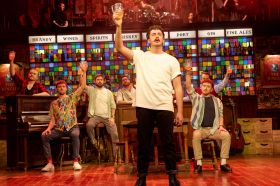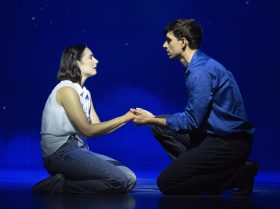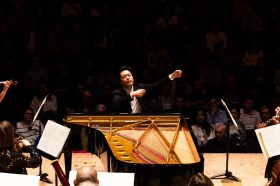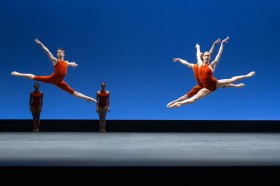I want to shake Lindsay Posner’s hand! This newly opened and effulgent production of Fiddler on the Roof is a wonder to behold, and has rightly transferred from its sell-out run at the Sheffield Crucible to the glittering heart of London’s West End to shine among the brightest in its constellation.
Based on the stories of humourist Sholem Aleichem’s stories of Tevye der Milchiger (Tevye the Milkman), Fiddler tells the story of Tevye (Henry Goodman), his wife Golde (Beverley Klein), his five daughters, and the traditional orthodox Jewish community set in the shtetl of Anatevka. It is set against the backdrop of the pogroms of prerevolutionary Russia, the desperation and persistance of those upholding their faith under such continuous persecution and is, in many ways, a prefigurement of the horrors to come during the first and second world wars. Yet Joseph Stein’s book, Sheldon Harnick’s lyrics, and Jerry Bock’s music make what could be the most depressing visit to the theatre this side of ‘Anne Frank, The Musical’, the absolute must see of the season.
Henry Goodman is faultess in his portrayal of the kvetching and gisticulatory Tevye. The protagonist has a wonderfully disarming charm about him which is irresistable, and whose life, as well as the lives of those around him, constantly stares poverty, tragedy and fear full in the face. From the opening prologue into the fabulously rousing first number, which also allows the audience first view of Peter McKintosh’s gloriously unfussy yet substantial revolving shtetl, via the energetic and perfectly placed rendition of ‘If I Were A Rich Man’ and the heart-stirring duet with his wife of 25 years ‘Do You Love Me?’, through to the fall of the curtain, Goodman bestrides, like a colossus, the stage and the imaginations of those watching.
‘Tradition’ is not only the first offering from the rightly celebrated musical score, but also, as a concept, acts as the narrative glue from which the true meaning of this story is taken. During this opening sequence, the wonderfully charismatic and fantastically costumed cast emerge from behind, atop, and athwart the set and into the first of many of Jerome Robbins’ choreographed routines (touchingly reproduced for this show by one of the dancers from the very original 1960’s cast, Sammy Dallas Bayes). The story then proceeds in typical comical Jewish fashion: Tevye’s three eldest daughters Tzitel, Hodel, and Chava (wonderfully played by Frances Thorburn, Alexandra Sibler and Natasha Broomfield, respectively) become, conventionally, the playthings of their mother Golde (played impeccably and beautifully sung by Beverley Klein) and Yente the Matchmaker (captured beautifully by the outstanding method of Julie Legrande), who both scheme and plot to find a suitable match for the daughters. Whichever one is deemed suitable enough, their father then deems appropriate! Unfortunately for Tevye, his daughters have more avant-garde leanings of the heart and of the head.
The eldest, Tzeitel, refuses to marry Lazar Wolf (Victor McGuire) the choice deemed most approriate by her elders (and a match agreed upon in a comically misunderstood duologue between Goodman and McGuire), in favour of her childhood sweetheart Motel (Gareth Kennerly). Hodel chooses the radical Perchik (Damian Humbley sings like a dream) from Kiev, and Chava insists on choosing Fyedka. It is this last, touchingly performed, pairing that finally, after so much bending from, and accommodating of, his beliefs for his daugheters, that Tevye snaps and refuses to accept nor give blessing to Chava and her chosen Russian. Only in the final scene, as the villagers have been told they have three days to pack their things and leave the area, does Tevye heartbreakingly acknowledge the pairing and wishes them a safe journey away from Anatevka.
Along the way there are glorious performances form the supporting cast, particularly the men whose skill and determination to dance with real glass bottles on their heads has the audience on the edge of their seat, and holding their collective breath. Tomm Coles puts in a charmingly comic turn as Mordcha the bar keep (and who, incidently, alongside Goodman and only one or two of the other men, had the good sense to grow his own beard!), and Juliet Alderdice is a splendiferous flying ghostly apparition.
Tradition is the narrative, musical, theatrical and emotional thread of this show. It is never undersold. Every practical detail of Jewish Orthodoxy is undertaken almost subconsciously by this well honed and intelligent cast. From the Mezuzah on the door frame which everyone touches, and which is a constant reminder of God’s presence, to the wearing of Yalmulkes, Tzitzits and Tallits, and also the odd appearance of a Menorah, it is hard to miss that Judaism is not only the cornerstone, but the driving force, of this show. As the anti-semitism of the second act reaches its height, the community surrender to the brutal force of the Russian soliders and are forced to depart Anatevka. In the same way that Tevye’s daughters and their spouses have ‘pulled on threads of’ the tradition that not only binds the community and the family in a common belief structure, but IS also that common belief, so the Russians break it up completely and disperse it in no less strong, but much smaller fragments of what it once was. As history would have it, some 2 million Jews would be forced out of the Pale of Settlement during these years, and many more millions would defy its centuries-old boarders when the Germans invaded Russia. Over 250,000 Jews were resident in London in 1919, today there are 300,000. A heartbreaking and horrifying figure in light of the events that were to occur in the years following these times here depicted.
Fiddler also has a meaning relevant for us in our time of religious and cultural diaspora, which stands firm like the timber frames of the Sthetl itself, and almost alone among the current west end musicals. It is that Fiddler, and particularly it’s strong undercurrent of tradition, if it is ‘about’ anything, is about how one man learns to except that he can uphold and celebrate tradition yet bend to and from, and accommodate, the changing winds of modernity, without defying that tradition.
We are lucky to live in the democratic free west. Yet how often are we made aware of a similar fate to that of Tevye’s family facing dispersed peoples across the globe? How easy is it to allow so many new-fangled trends, radical ideas and useless initiatives to erode what is important to us and what we hold dear, without our even noticing it before it’s too late? When you all flock to see this wonderful show, let Tevye’s plight be a lesson; that what is good, and what is noble, and what is true can be tested and bent and accommodated but is always worth fighting for. And if you see Lindsay Posner, forget the handshake, give him a hug from me.
Fiddler on the Roof is showing at The Savoy Theatre, The Strand, London WC2R 0ET, until 28 September 2007.




